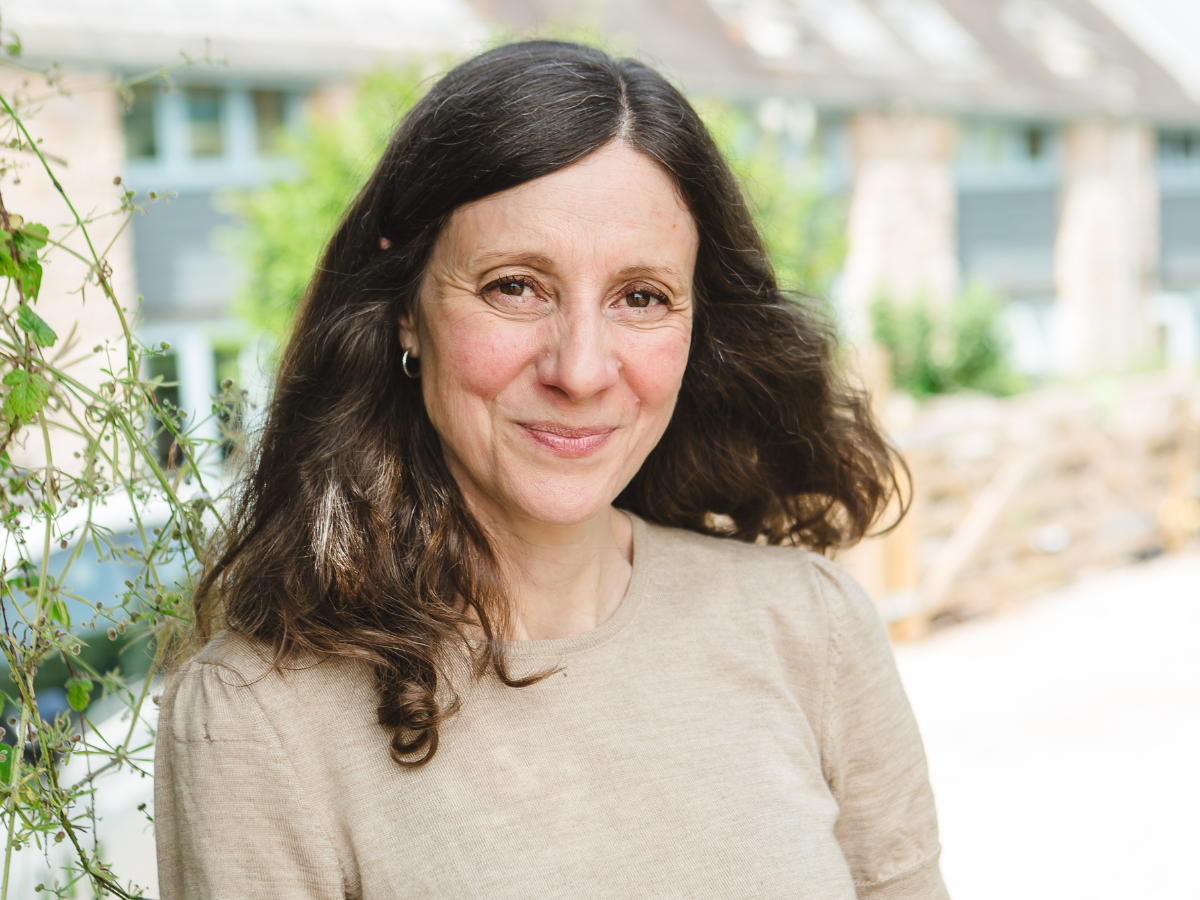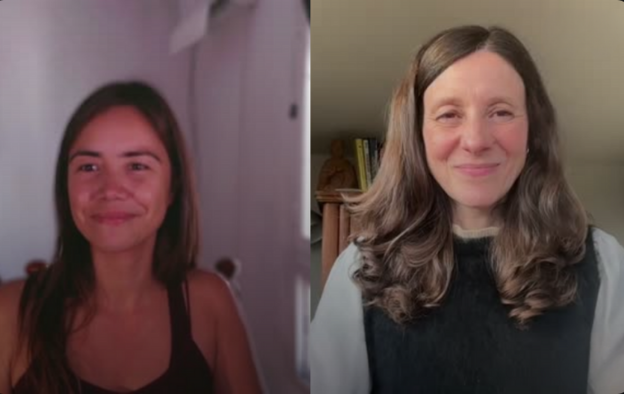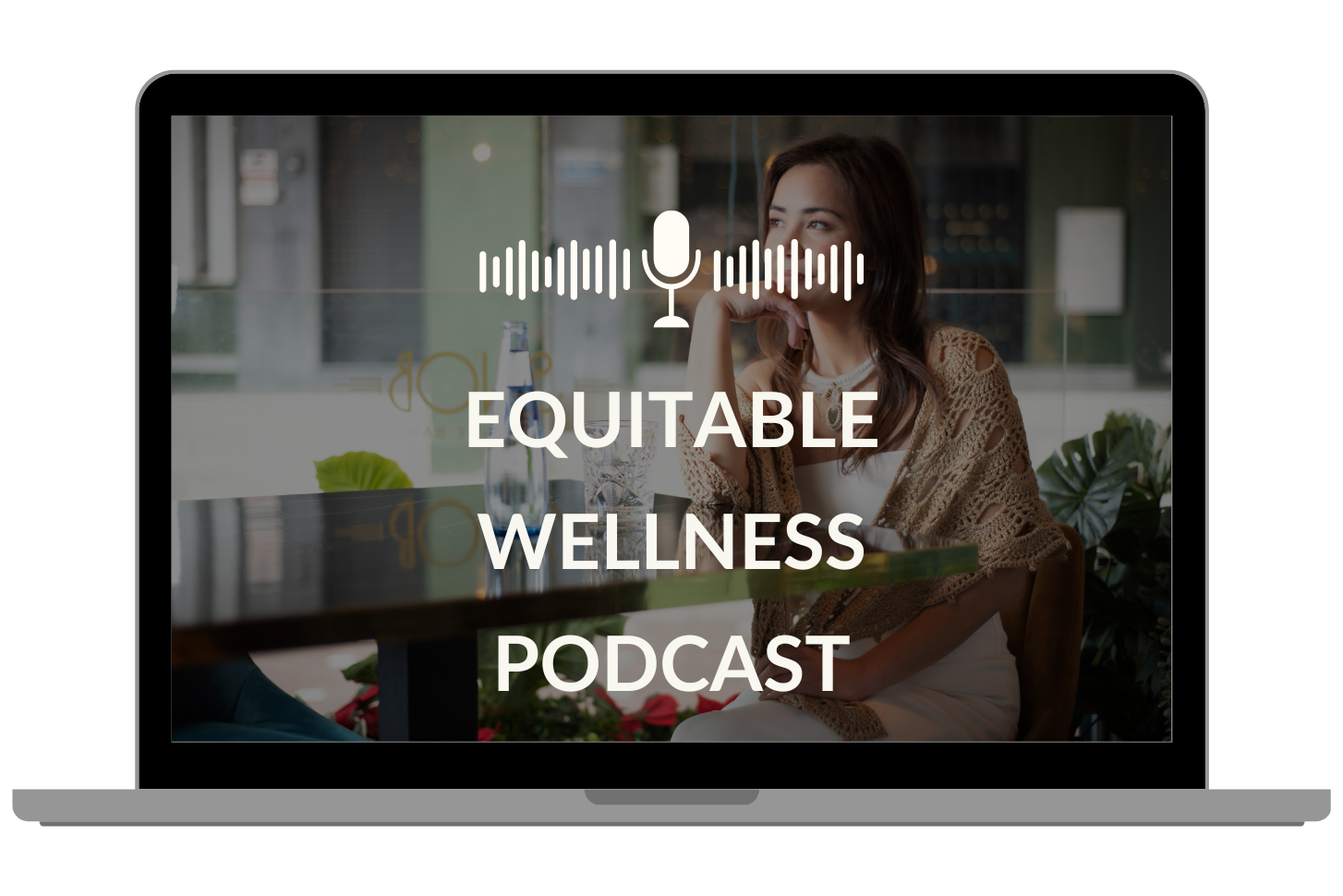The Reluctant Capitalist: Marisa Guthrie on Ethical Business
For Marisa Guthrie, writing the forthcoming book The Reluctant Capitalist is an act of “audacious hope.”

The Reluctant Capitalist: Profit, Purpose, and Collective Liberation
We reckon the promise of thriving in business and supporting our families, knowing fully well that the very system enabling this success is based on global injustices and systemic oppression. How does one walk the path of sustainability and solidarity, as values clash with the realities of making a living? This is the paradox at the heart of The Reluctant Capitalist, the upcoming book by business coach Marisa Guthrie.
For nearly 30 years, Marisa has coached solopreneurs and small businesses to align profit with ethics and social justice. And all whilst operating within capitalism.
Listen to this Equitable Wellness podcast episode with Marisa Guthrie
Our conversation centers on The Reluctant Capitalist: Marisa Guthrie's abiding wisdom.
Where else to listen
YouTube | Substack | Apple Podcasts | Spotify
Read the full transcript here
Part 1 of 4 — 00:00 to 11:12
Shayna Grajo
00:09-01:00
All right, welcome everyone to the Equitable Wellness podcast. I'm your host, Shayna Grajo, and this podcast invites practitioners dedicated to equity and liberation work to take the mic. We look at how holistic practitioners, coaches, healing artists and businesses incorporate collective liberation into their practices.
And today, I am joined by Marisa Guthrie, who goes by the handle of The Reluctant Capitalist™ on Substack. She is the author of a book by the same name, The Reluctant Capitalist, the topic of today's episode. I can't wait to introduce Marisa and get into her new book, Welcome Marisa, Marisa, tell us where you're calling in from today.
Marisa Guthrie
01:01-01:25
Hi Shayna, I'm so happy to be here today. I am calling in from the southwest of the UK, a place called Devon. It's very rural, so fingers crossed that all our connections are fine.
So yeah, I'm really, really happy to be here with you today.
Shayna Grajo
01:25-06:58
I am so happy to have you on the show. thank you so much for being here all the way from the southwest of Britain there, all right.
Before we move into the topic of the podcast, which is The Reluctant Capitalist, your new book that I'm excited to hear about, I am going to take a moment. Thanks also to Marisa's consent to share a few words on solidarity and a statement of solidarity for Palestinian liberation.
The release of this podcast is scheduled for the Full Moon, which lands on October 7th, as we speak of the 23rd of September, 2025. Today, as of recording, the Global Sumud Flotilla of 51 vessels sails the Mediterranean, heading east from Greece, Italy and Malta, bearing civilian activists from 40 countries to stand with the Palestinian people. The mission of the flotilla is to break Israel's siege of Gaza and open a humanitarian corridor by sea.
They are building on decades of Palestinian resistance and international solidarity to shift the global narrative and confront international complicity. Humbly, I, Shayna Grajo, a daughter of the Jewish and Philippine diasporas, resident of Spain and dual citizen of the United States and the Philippines…
- Lament the impunity of the active state of violence-as-usual, business-as-usual, and genocide-as-usual that we collectively call our economy.
- Condemn perpetrators and oppressors in the civilizational collapse of Gaza, namely Israel, the United States, Britain and the European Union.
- Lament the silencing, censorship and denial of war crimes that have claimed the lives of at least 65 ,344 Palestinians confirmed killed since Israel's war on Gaza began two years ago.
- Lament my own silence and complicity as I and others contribute to murder through our tax dollars and through surviving dominant, oppressive systems that profit from crimes against humanity.
I stand with the Palestinians in Gaza as they resist Israeli settler colonialism and apartheid dating back to decades before October 7th, 2023.
I applaud the consistent and unwavering everyday efforts that are pro -humanity, from the sanctions of Spanish Prime Minister Pedro Sánchez, to the sailing of flotilla activists, to the disruptive conversations of friends.
And I pray that the unimaginable suffering of survivors and descendants of genocide in all lands and all times be delivered to justice for healing, forgiveness, reparations, rematriation and reciprocity.
Nelson Mandela once said that Palestine is the greatest moral issue of our time. As the Columbia Students for Justice in Palestine put it, “Palestine is the vanguard of our collective liberation.” The imperative to support liberation is one of global solidarity. That we may recognize the interconnected forces contributing to ethnonationalism in Israel and other nations—capitalism, racism, state violence, surveillance, incarceration, and evangelicalism.
That said, let's proceed with today's talk. If you are watching along on Substack or YouTube, you can find the full episode notes online on Substack at Equitable Wellness. Subscribe to support this work, join the community, and have episodes dropped right to your inbox. And if you prefer to read, a full transcript will be available on my website blog at shaynagrajo.com, link in the notes.
Let me introduce now the Reluctant Capitalist Marisa Guthrie, the invited guest here today. Marisa Guthrie is a business coach and entrepreneur who helps solopreneurs balance profit and purpose so they can grow their income without compromising their ethics or their well -being. She supports solopreneurs in creating business models that have social justice baked into them, ensuring their work aligns with both their purpose and their financial goals. With nearly 30 years of entrepreneurial experience, Marisa brings deep expertise in building ethical, sustainable businesses that thrive.
And I do voluntarily acknowledge the elephant in the room that I am one of Marisa's coaching clients currently.
All right, that's my longwinded, as always, epilogue.
Marisa Guthrie
07:00-07:55
I mean, I just—before we move into the topics today, I just want to say that while you were reading that, I was getting full body chills. And as you were reading it, the images that were coming to mind were of this kind of machine, the machine like systemic oppression of the Palestinian people, peoples going back over millennia. And as you were speaking, I was reflecting on what we're going to talk about.
The being a reluctant capitalist and how that plays into that whole machine, the systems, the structures. It just gave me so much to think about and thank you so much for saying it, and I am with you on every word, every step of the way.
So thank you.
Shayna Grajo
07:57-09:01
Well, thank you, yeah. These ties are definitely interconnected: the forces of oppression have links together, and the forces of liberation as well are interconnected. And so, taking this kind of holistic viewpoint, of course, your work, our work together, separately and collectively, definitely tie into a bigger picture of what's happening in our world as individuals and as…
I hope, you know, hope for our future and our present.
So we will start with the title, OK, The Reluctant Capitalist. This is a great capture for the word reluctance, of this, of this framing. What do you have to say about the title for your work?
Marisa Guthrie
09:02-11:12
Yeah, well, it was interesting that it, and I just want to say the book is in the process of being published. So it's not going to be out till 2026. But, you know, watch this space.
It came to me, it came to me in a moment about five years ago, and I was sitting there mulling. I don't even know what I was doing, but I distinctly remember that that was the phrase, that was the phrase that captured and really encapsulated my response to the world that we're living in. So the reluctance is the fact that when you were saying in your statement, acknowledging that. We profit from a lot of those structures and systems, the same ones that allow these other forms of oppression to happen.
That's really the reluctance right there. I have spent time in my life, when I was much younger, trying to escape capitalism and trying to live outside of capitalism. And frankly, I couldn't do it. And so the reluctance is the fact that I am here as I sit here with you. Today, I look around my office and the things I have around me, and I can see a lot of those things…
All of those have been created under a capitalist system. That at the same time as me benefiting from it and all of us benefiting from it, I deeply have a deep antipathy towards and a loathing towards. And so what do we do with that? So it's really about acknowledging that for those of us that think deeply about these things, that's where we're at, we're in it.
We don't like it, we want it to change, it's going to change. But while we are building new systems, how do we, how do we square that circle with ourselves?
Part 2 of 4 — 11:15 to 19:56
Shayna Grajo
11:15-12:38
Great, you definitely help many entrepreneurs, solopreneurs, small businesses, micro businesses in squaring that for themselves. Through your extensive coaching practice and your lived experience of grappling with all of the moral plights of leading an existence. Tending to one's capacity, the resources required for one's family, one's self. So that, yes, hopefully we can in our future see these systems change to where, instead of the default extractive construct, it is one of regeneration, one of supporting and nourishing systems that lead to, I don't know, more permanence for lack of better words.
So let's see the tension between needing to survive within capitalism and resisting the values. Can you speak to this paradox personally, and then maybe just also how you guide others with the challenge of resisting while surviving?
Marisa Guthrie
12:40-16:04
Exactly, and hopefully thriving.
OK, because we are already stuck in survival mode in capitalism because of the way that it's set up. So what I realized a while back is that all the businesses that I work with… Because they're solopreneur businesses just by definition, they're one person or maybe a few people, but usually one person enterprises… They have certain values baked into them regardless. So one of the things that I do in my work is to help those businesses be able to profit from capitalism.
For want of a better word, or at least not conflate being a capitalist with making money, we need to make money to live, to thrive and go beyond survival.
And we cannot do that outside of capitalism, when people talk about escaping capitalism. And this is what I realized fairly early on, when I was trying. My own version of that is you need money to do that. So, you know, there are a lot of the more sort of libertarian folk, I would say, that are looking at.
It's called seascaping, where you basically create islands for super wealthy individuals so they can escape the system. But for the vast majority of us, we cannot do that, even if we wanted to. So I'm much more interested in eroding capitalism. How we do that on an individual level is we ,.
And to me, sovereignty doesn't mean sovereignty is a word that is used by the right. And it's used by the sort of what I would describe the neoliberal, the libertarians, to mean individualism. To me, it doesn't really mean that. Sovereignty means being able to be an individual, a sovereign being whilst in connection with others. And that means that when we can really hold those two things and understand that we are all interconnected, whether we like it or not.
That we need to make sure that our own needs are met, that the way that we grow is by being resourced. So for me, that's just a small way that I kind of manage that tension.
And yeah, and I think that that's the main way that I help my clients is to really be able to say, OK. What are your needs? How does your capacity and energy work for your business? Without trying to say this is how it should be done? And if it isn't being done this way, then you're a failure or you're never going to make it work. So, yeah, it's about being able to hold that sovereign self and also understand that we are all interconnected and we are doing this collectively.
Shayna Grajo
16:06-17:07
I love that you use the term eroding capitalism. Maybe resisting capitalism wouldn't be what you would say.
But I appreciate that you've given a lens of how these business decisions are. You have a different framework for looking at these day-to-day practices, and you've shared overall how that is the scope of your work, of the erosion.
Let's, I guess, I don't know, get into the book a bit. You work with people as a coach and you have for somewhere around again, years and years.
Yeah, 20 years, or however many years coaching. But what brought about the motivation now for a written compilation as a book?
Marisa Guthrie
17:07-19:56
Really good question. So I heard this writer the other day saying that they were talking about novels, saying a novel is an act of hope. And I would go one further, and I would say that a book is an audacious hope. When I thought about writing this book, the world was in a very different place. Five years ago. Yeah, we'd seen Trump and, you know, Covid was… we'd been dealing with Covid, etc.
But I still felt this passion to be able to give a reframe to what I have heard business owners saying for the best part of 30 years now, including myself. And I think when one writes a book, you write it for yourself as much as you do for other people, and I've partly written it.
Also because I wish it was a thing that I had had when I was starting out or as I was developing my business. You know, I'm nearly 30 years in, so I think my journey would have been very, very different if I'd had this even 10, 15 years ago. So it's really this audacity, I guess, that has kept me going.
And this notion that it goes way beyond me, because, if so, Simone Seol recently, the fantastic entrepreneur and coach. I'm not sure if she calls herself a coach now, but you know, she's of Filipino heritage, as far as I understand. And she, she was describing the scenario where, OK, there's two different towns.
One of them is run along collective community lines, and you know, we have all these fantastic ways of working together, the other one is run along pure profit. Where the people that are invested in that town are never a part of that town. And she said, Where would you prefer to live?
And I know where I would prefer to live, and so in my humble, extremely humble way, with my very small following. That is what I'm trying to do, I'm trying to create collectives, communities, towns, counties, states, countries where people are invested. The people that live in those communities are invested in them.
And for me, there is a vital distinction there. Because that's how we really look after things, when we are fully invested in the communities that we are living and working in. So, if the book can even begin to do a very small part of that work, I will be happy.
Part 3 of 4 — 19:56 to 30:44
Shayna Grajo
19:56-21:06
Yeah, that is beautiful.
Definitely values I share as well, of living as much on the ground as online. I know I've personally gone through some waves of deciding, wait a minute. I've been tripping out a bit on digital marketing and remote work and being online.
But what about being in my own two feet and my local zip code? Which is ironic because for so much of my professional life, I've always been in my feet and on the ground. But yeah, thinking about this, right? Collectively, it comes back to land resources, community, being embodied, being a human being at a human scale, ultimately with other people.
So that real breathing people also are not just discarded as if it were— I don't know, a commodity—or a… right, I don't know there's other derogatory terms for it.
Marisa Guthrie
21:06-21:12
Yeah, and it's about labor, really, it's about how labor is used.
Shayna Grajo
21:14-21:27
Yeah, what kind of research did you put into writing your book? Were there different authors you consulted or other published works? How about the research?
Marisa Guthrie
21:30-24:59
You know, it's interesting because you were talking about Nelson Mandela. I was in South Africa as a student a year after apartheid fell. And I traced the threads of this book and all my work back to way before that, actually, because I grew up with apartheid in the sense that it was one of the things that we fought for. So I feel like the research that I've done for this book has been like my whole life, really.
I grew up in London in a very multicultural community. My dad's Italian, so I had that kind of immigrant reality as well. So I feel like a lot of my research came from things that have been bubbling away for me for a very, very long time. But what I decided was, in writing this book, it wasn't enough. Just to say, we're reluctant capitalists, and here's what we do to kind of get out of this and to erode capitalism.
I just want to answer your question by also saying that phrase about eroding capitalism, that comes from an American economist. A sociologist, I think he is, who's now sadly died. Called Eric Olin Wright, he talked of the four ways of being anticapitalist today. I think he wrote the article a few years ago. One was smashing, one was escaping, one was legislating or regulating, and the other one was eroding.
So for me, either of those ones. There's no way we can regulate against capitalism now. If it was going to happen, it would have happened and it hasn't, and it's not going to. So, for me, erosion is our best chance. I also looked a lot at the work of a UK economist called Kate Raworth, who wrote the book Doughnut Economics, which is about the circular economies and lots of examples around circular economies.
And then the person that I really credit, who's inspired me for a very long time, is the investigative and environmental journalist George Monbiot, who has been a hero of mine for a very long time. But that is really just a snapshot, because if you read the bibliography and my notes, you will see that I have… In fact, it's becoming an issue when I'm working with the editor. It's going to take quite some time to go through because there's so much in there.
The TV programs you probably are aware of. Roots—what was called a miniseries back in the day—which was a book* that they made into a series about slavery and looking at how capitalism was implicated in that. So I go into lots of detail about it, but those are really the main writers that I kind of dipped into while I was writing the book.
Shayna Grajo
25:01-25:48
Wow, thank you for sharing, writing a book. I mean, I definitely applaud you for that. It's something that I think we all ought to value more in our society, today especially.
With you being a real writer, some people might not even take the time when you could just get AI to do something. And why put in the labor, the sweat—that huge, colossal effort into this body of work?
Marisa Guthrie
25:48-27:00
It was my baby, but I'm thrilled.
Yes, so I will be doing something called hybrid publishing. So rather than wait around for a long time trying to get a publishing deal, I am going for what's called… So it's a cross between self-publishing and publishing-publishing. Basically, you are working with a hybrid publisher who does a lot of that work for you.
But they don't. Then you have a lot of control as the writer. Because obviously, writing a business book is a very different enterprise and has a completely different purpose than writing a work of fiction. So I'm currently in conversation with three publishers and one of those is definitely going to come to fruition.
So the timeline is that it will take a little while. They've got the manuscript, but we'll be looking at going for a launch next summer, 2026.
Shayna Grajo
27:00-27:53
Okay, wow, so yeah, for our purposes, this can be a little preview talk. But I'll definitely plug that everyone finds the book when it's out and that we all support it and share in the conversation of it. I'm definitely looking forward to reading it. So we could talk, I guess, a bit about what it means to be anticapitalist. I know that that is a word that you use to describe yourself and your practice as a coach.
And you also did already touch on the fact that this does not mean shunning money altogether. But yeah, how would you define financial sustainability within an anticapitalist construct?
Marisa Guthrie
27:53-30:44
Yeah, sure. So what I want to say about being anticapitalist, first of all, is that it's not easy. It isn't just a decision that you make and you say you have to live it and you have to breathe it. And for me, it's constantly unraveling.
But the ways that I think about it are in the whole way that we look at our business and building up our business from the ground up. It means looking at every system, every process, every practice in particular of how do we, and I want to say you're either in or you're out? It's a work in progress.
One of the things I'm grappling with, for example, is when the book is published. Am I going to use Amazon? Because Amazon is something that I have boycotted for over a decade? For the way that it makes money, it's straight out of the robber baron extraction, playbook extraction and exploitation, and that's how it manages to make profits.
So what am I going to do when it comes to selling the book? Because more people are going to be able to find it if it's on Amazon than if it isn't. So, for example, that's a big dilemma for me, one that I haven't answered yet. And I will be talking to people in my community, talking to you, talking to other people about what do we do about that? Because it feels like it's a collective thing.
And if my community say, you know, that is something that we don't want you to do, then I have to listen. So it is about, for me, thinking carefully about the whole ecosystem of your business. It's about that for me. I am very careful. Not only about how I make money and how it comes into my business, but also about where I'm spending it and who I'm spending it with.
And it is not perfect by any stretch of the imagination. So it is about each of us thinking on an individual basis, because our businesses are so different about how's money going to come in, and how do I make that money ethically, or as ethically as I possibly can in this system?
What do I... Where do I spend my money to make sure that it's being spent as ethically as possible? Who is it supporting? You know, what structures am I buying into if I spend this money with certain companies, individuals, whatever it may be. So, it has to come from both sides.
Part 4 of 4 — 30:44 to 39:48
Shayna Grajo
30:44-31:42
Yeah, it's amazing that you have the capacity to be so thorough and thoughtful in all of these decisions and all of these points of contemplation, as independent beings and agents.
What are some of the thinking errors of entrepreneurs when they do try to make more values-aligned businesses? It probably seems right that people are unable to profit and make a thriving business, have ample resources within such an oftentimes destructive construct. So where can you help people kind of come across the different flaws of thinking that you've come across?
Marisa Guthrie
31:47-35:16
Yeah, so just to the thinking error is to me, and the way that I think about it is: It's the thing that your client thinks is the problem, but you as the business owner know it's something else. So money is a perfect example of that. To so many of the solopreneurs that I work with—the purpose-led, you know, wanting to do good work people that I work with—money is the biggest block because they've already internalized this idea that making money per se is wrong. My wonderful colleague and friend in the States, Maegan Megginson, talks about being the bleeding heart business owner. Where we go, “Oh, that's okay.
I'm just going to charge really low prices so everyone can work with me. I'm going to give away a ton of stuff for free.”
And then wonder why they can't meet their own needs, and wonder why they're burning out. And you know, their wellbeing is struggling and they're not able to support their families, and so on. Because it is really the biggest conflation, is the biggest thinking error that solopreneurs have. Making money is separate to being a capitalist for me.
I'm sure the economists would argue differently, but for me, it's about the difference between capitalism being the economic system. But money is an exchange, it's a ritual between human beings. We decided we were going to create this thing called money that would be a symbol of something.
Our wealth, our worth, our productivity, our labor, our et cetera, et cetera. But money is neutral, money doesn't care. So for me, one of the biggest things that I have to unravel with most business owners that I work with. Not all, I would like to say, but just being able to get them to feel safe enough to make money, to charge premium prices, to be able to have high ticket offerings as well as, you know, other offerings across the board.
Because what they do is they gaslight themselves. Oh, I, if I'm making money, I must be the problem. Rather than being able to say, this is not you, this is a systemic issue. You've been, you've been, you've internalized this idea, and you've been taught that you get to make a choice.
Like, when you leave school, leave university. You either are going to do good work for not much money, or you're going to sell out. And you're going to earn a little. You know, you're going to earn a good wage, or maybe ridiculous amounts of money, but you can't have both. I know now that that is not true, but I was that person for a very, very long time and it really took its toll on me.
I'm happy to say I'm not in that position now, but I'm in my fifties and it's taken a really long time. So for me, that is, we could go into many other thinking errors, Shayna. But for me, that's the biggie. That's the biggest one.
Shayna Grajo
35:16-39:02
Yeah, no, I think that's the central crux of how you support people is to… not see it as a either-or, right. And to prove and help people prove that, indeed, that error can be overcome and that the abundance can be reached and shared, right? It's so very, so very nourishing.
And of course, like, as you now have a, you know, a video testimonial, I. It's been very helpful for me, right? Somebody who's also had these kinds of errors mentally. And I'm sure again, so many people still have, yeah, are coming through the traumas of again, just day-to-day survival.
Which, again, to tie it back to the beginning, is tied to some pretty destructive things in our world. Right in the system that you are criticizing and in your writing.
So, gosh, let me I'm thinking we've talked a good bit about a lot of things. I think we've given a good overall sampling of what you want to speak to, what ideas you're sharing with the world, the framework that you have and have come to through so much experience. I guess here I'll take the break to share tools and resources for anyone who would be interested in further pursuing your offers. If you have connected with the story today so far, here are your options for further connecting.
You can sign up for her free masterclass, Ethical, Fair and Fearless Pricing for solopreneurs who want to do good and make money.
I will put all of the links in the show notes.
You may also enroll for Marisa's Ethical Money Mastery Course to help you build ethical wealth without compromising your values. You may also book a free call with Marisa to explore her coaching programmes. With the good old British programmes, with the two M's and E’s that help build a thriving—I'm going to write it in the British English—There for you to help build a thriving business ecosystem, aligning with your values, needs, and capacity.
And, of course, you wouldn't want to miss signing up for Marisa's fantastic newsletter, The Reluctant Capitalist™ on Substack. We both are Substack lovers and of course, you've gotten started ahead of time. I'm catching up to the wonders of it.
But Marisa is persistent in publishing great Notes and great articles and publications that are food for thought. I know that we have a lot of content these days in the inbox, in our platforms, but I do make sure I take the time to read Marisa's thought processes. I get a lot out of it and appreciate that somebody else can empathize and share in my viewpoints about things.
Okay, anything else? I wonder? We don't have to go all the way to 45 minutes, we can cut it short.
Marisa Guthrie
39:04-39:08
I've got to, yeah, I've got to go soon, but yeah.
Shayna Grajo
39:10-39:27
Okay, perfect. Well, then, Marisa. Thank you so much for being here today. And again, we look forward to hearing more about the release of your book. And again, just thank you so much for sharing your perspectives today.
Marisa Guthrie
39:27-39:40
Shayna, it's just such a joy and a delight to talk to you always. And I feel very honored and blessed that you've invited me into your podcast and I applaud the amazing work that you're doing. So thank you so much.
Shayna Grajo
39:41-39:45
Yes, thank you, all right. Take care.
Marisa Guthrie
39:45-39:46
Bye, bye.
Shayna Grajo
39:47-39:48
Bye.
The Elephant in the Room: Solidarity and Systemic Injustice
The episode begins with a statement of solidarity for Palestinian liberation, connecting global struggles for justice to our everyday choices as business owners and people. Our institutions, governments and economic systems are complicit in violence and oppression that we support through tax dollars, consumer choices, and—let's face it—simple survival within dominant structures.
Marisa’s anticapitalist approach to life and business is to embody the personal as political: to see the interconnection between our solopreneurial lives and broader systems of power.
Meet Marisa Guthrie: The Reluctant Capitalist
So, who is Marisa Guthrie? Calling in from rural Devon, UK, Marisa brings nearly 30 years of entrepreneurial experience helping solopreneurs and microbusinesses reconcile profit and purpose. Author of the forthcoming book The Reluctant Capitalist, Marisa guides us through her writings and programs to design ethical, sustainable business models rooted in social justice, nervous-system awareness, and collective liberation.
Marisa’s philosophy is refreshingly honest. For years, she would have preferred to “escape” capitalism, yet she now works within it (albeit, reluctantly). The title “The Reluctant Capitalist” captures this tension perfectly.
“I am here, as I sit here with you today, I look around my office and the things I have around me,” Marisa tells us in the podcast.
“All of those have been created under a capitalist system that at the same time, as me benefiting from it, I deeply have a deep antipathy towards, and a loathing towards, and so what do we do with that?”
Living the Paradox: Surviving and Eroding Capitalism
Escaping the system and opting out of capitalism is not available for the vast majority of us. Marisa’s path doesn’t resemble that of a billionaire elitist building her own island. Instead, Marisa advocates for “eroding” capitalism from within the system, a concept coined by sociologist Erik Olin Wright. This means making choices that renounce and erode exploitative practices, while also ensuring our own needs are met.
Marisa uses the word “sovereignty," but not the rugged individualism touted by libertarians. She refers to a more relational sense of autonomy rooted in community, mutual support, and interrelationship. Her coaching helps clients to clarify their needs, honor their capacity, and design businesses that both nourish themselves and rebuild the world around them.
Why Write a Book? Audacious Hope and Community Investment
Why did Marisa decide to put her philosophy into a book? For her, writing The Reluctant Capitalist is an act of “audacious hope.” Not only is she creating a resource she wishes she’d had 30 years ago…
She's also envisioning communities where people are truly invested, beyond their individual successes. She draws inspiration from thinkers like Eric Olin Wright, Kate Raworth (author of Doughnut Economics) and George Monbiot, while integrating experience from her own multicultural upbringing and nonprofit background.
Money Isn’t the Enemy: The Separation of Capitalism and Money
One of the biggest ways Marisa helps purpose-driven entrepreneurs is to reassess belief patterns about making money as somehow inherently wrong. Marisa says her clients often gaslight themselves in conflating financial sustainability with complicity in exploitation.
For Marisa, money is a neutral tool and a ritual of exchange. With coaching, her clients therefore learn to charge fair prices, thrive financially, and avoid burnout without abandoning their values.
“Making money is separate to being a capitalist for me,” Marisa says, while noting some economists might disagree with her. “Money doesn’t care.”
The Long Game as an Anticapitalist
Being anticapitalist "is not easy" and is a constantly unfolding work in progress, Marisa tells us. No one ever gets it perfect. Marisa for instance shares her dilemmas about whether to sell her book on Amazon, holding both that she’s boycotted it for years, but that it could also help her book’s reach. She encourages entrepreneurs to thoughtfully consider not just how they earn money, but how they spend it, and who benefits.

The Goodies: Tools, Resources, and Next Steps
If you loved today's episode with Marisa’s story, then you'll surely want to connect with her and aprovechar or make the most of these opportunities!
- Free Masterclass: “Ethical, Fair, & Fearless Pricing” for solopreneurs
- Ethical Money Mastery Course: Build ethical wealth without compromising values
- Newsletter: The Reluctant Capitalist™ on Substack—the place to be! Can't recommend enough.
- Coaching:
Book a free call to explore how Marisa can help you build a thriving, values-aligned business
In Summary: How De We Resist Capitalism, Thrive, and Create Meaningful Change?
And more importantly, can we do so together? In community? Marisa Guthrie’s work challenges us to rethink what it means to thrive on our own terms and in harmony with the collective impact we look to see. But it's only a starting point for letting it dawn, that there is another way. We don’t have to choose between our values and thriving. By eroding extractive systems from within, supporting community investment, and making thoughtful choices about money, we can develop a new worldview and holistic approach.
What do you think? Have you wrestled with these dilemmas in your own work or life? Are you Reluctant AF? Reach out to share your thoughts, or join the conversation on Substack. ♥
Further Reading and Selected Links from the Episode:
- Doughnut Economicsby Kate Raworth
- George Monbiot’s journalism on environmental and social justice
- Erik Olin Wright’s How to Be an Anti-Capitalist in the 21st Century and "How to Be an Anticapitalist Today"
- Roots: The Saga of an American Family by Alex Haley
- Simone Grace Seol — Liberatory Business podcast
- Maegan Megginson — Deeply Rested podcast
- See episode post on Substack at Equitable Wellness
Related Topics
- Ethical entrepreneurship
- Collective liberation in business
- Building regenerative business models

Join Us on Substack Live on Monday, November 3.
Normally I do video recordings for the podcast, but in this episode there were some technical difficulties. Instead, I invite you reluctant capitalists to join us for a Substack Live!
Join us Monday, November 3, at 12pm New York / 5pm UK / 6pm Spain time! It'll be my first time hosting a Substack Live. ♥

Welcome, I’m Shayna Grajo
Hi, I’m Shayna Grajo. I help healers, educators & artists build a long-term, sustainable marketing presence through SEO, copywriting, and website design. Together we nurture digital spaces and sustain your visibility with ease and integrity.
JOIN NOW
Equitable Wellness on Substack













